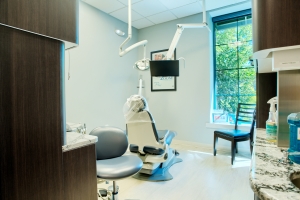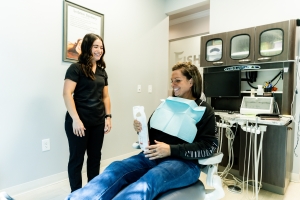Key Takeaways
- Pain-Free Dental Experience: Local anesthetics help block pain signals, allowing patients to undergo dental procedures like fillings, root canals, and extractions with minimal discomfort and reduced dental anxiety.
- Variety of Anesthetic Options: Commonly used anesthetics include lidocaine, articaine, mepivacaine, prilocaine, and bupivacaine, each chosen based on the procedure length, patient sensitivity, and desired numbing effect.
- Safe and Personalized Care: The Fishinger Dental team evaluates each patient’s medical history, medications, and health conditions to safely administer local anesthesia while minimizing risks such as allergic reactions or drug interactions.
- Advanced Administration Techniques: Local anesthetics are administered via injections, topical anesthetics, or computer-assisted systems like The Wand, ensuring accuracy and patient comfort during dental treatment.
Feel Comfortable and Pain-Free During Your Dental Visit
At Fishinger Dental in Hilliard, OH, we understand that many patients experience dental anxiety when it comes to treatments like dental fillings, root canals, or extractions. That’s why our dental team uses local anesthetics in dentistry to ensure a pain-free, comfortable dental experience. Whether you’re visiting us for a routine procedure or a more complex treatment, you can trust our Hilliard sedation dentist to prioritize patient safety, pain management, and minimal discomfort.
Call our Hilliard dental office today at (614) 771-6060 to schedule your appointment. We proudly welcome patients from Columbus, Dublin, Upper Arlington, Grove City, Westerville, and nearby Ohio communities.

What Are Local Anesthetics in Dentistry?
Local anesthetics are commonly used medications that block pain signals in a specific area of the mouth so patients don’t feel pain during a procedure. They work by preventing nerves from sending pain signals to the brain, allowing your dentist to perform dental treatments safely and comfortably.
Local anesthesia is most often administered through injection, though topical anesthetics and advanced delivery systems like The Wand (computer-assisted anesthesia) are also available for greater comfort.
With local anesthesia administered properly, patients can undergo procedures such as:
- Fillings for cavities
- Root canals to treat infection
- Tooth extractions
- Periodontal treatment for gum disease
- TMJ injections to reduce jaw pain
Types of Local Anesthetics Used in Dentistry
At Fishinger Dental, we carefully select the right anesthetic drug for your needs after a careful evaluation of your health and any medical conditions. Commonly used anesthetics include:
- Lidocaine – the most common choice, fast-acting and effective.
- Articaine – highly effective, even in inflamed tissues.
- Mepivacaine – offers longer-lasting numbing for lengthy treatments.
- Prilocaine – suitable for patients sensitive to other substances.
- Bupivacaine – provides prolonged anesthesia, ideal for complex procedures.
Our dentist always explains the benefits and safety of each option before treatment.
How Local Anesthetics Are Administered
- Topical Anesthetics – applied before injections to reduce discomfort.
- Local Anesthetic Injection – numbs the affected area quickly.
- The Wand (Computer-Assisted System) – ensures precise delivery for a more relaxed dental experience.
Your healthcare provider may also adjust the dose for certain medical conditions (such as high blood pressure, heart problems, or pregnancy) to protect your safety.
Patient Safety and Risks
Local anesthetics are generally safe when administered by trained dentists. However, as with any anesthetic drug, there are rare complications, including:
- Allergic reactions
- Nerve damage or numbness in rare cases
- Drug interactions with other medications
- Difficulty breathing, slurred speech, or swelling (rare complication – seek immediate care)
Your dental team will review your medical history, medications, and any allergies to minimize risks and ensure your safety.
Local Anesthetics vs. Other Sedation Options
While local anesthesia keeps you awake but comfortable, some patients with severe dental anxiety or complex medical conditions may consider:
- Nitrous Oxide (Laughing Gas) – mild sedation
- IV Sedation – for deeper relaxation
- General Anesthesia – used in hospital settings for patients who need to be completely unconscious
Our dentist will discuss the best option for your comfort and safety.

Frequently Asked Questions
Are local anesthetics safe?
Yes. In most cases, local anesthetics are safe and effective when administered by a qualified dentist. The American Dental Association provides strict safety guidelines to protect patients.
Will I feel pain during the procedure?
No — the area will be numb, so you won’t feel pain. You may feel slight pressure, but minimal discomfort is expected.
How long does local anesthesia last?
Depending on the type of local anesthetics used, numbness can last anywhere from 30 minutes to several hours.
Can I drive after receiving a local anesthetic?
Yes, in most cases. Unlike IV sedation or general anesthesia, local anesthetics do not impair your ability to drive.
Schedule an Appointment at Fishinger Dental
If you’re searching for a dentist near you in Hilliard, OH, who offers safe, comfortable local anesthesia for dental treatments, Fishinger Dental is here for you. Our dentist and caring dental team are committed to providing a pain-free dental experience for every patient.
Call us today at (614) 771-6060 to schedule your appointment. We proudly serve patients in Hilliard, Columbus, Dublin, Upper Arlington, Grove City, Westerville, and surrounding Ohio communities.





